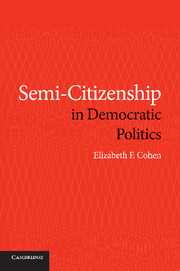Book contents
5 - Semi-Citizenship and the Disaggregation of Autonomous Rights
Published online by Cambridge University Press: 02 February 2010
Summary
INTRODUCTION
Autonomous rights, as defined in Chapter 2, are rights to goods that do not derive their meaning from any specific political context. Unlike the good of representation, for example, autonomous goods are valuable outside of the context of any specific political system. Autonomous goods – such as the right to secure residence, free movement, basic welfare, family formation, and freedom of thought and speech – take very similar forms for all people in all contexts. In contrast, rights to participate in a political process and more embedded civil rights, such as those associated with participation in the free market, derive their meaning from the political context in which they are generated.
Autonomous rights, as well as their relationship to relative rights, can be justified in a number of different ways. A Kantian liberal will argue that no one could legitimately be deprived of autonomous rights as long as they are rational and capable of self-rule. An ethical democratic theorist will argue that autonomous rights follow from one's membership in a political community, which implies that connection to these communities and the meeting of those terms ground autonomous rights. In turn, the administrative rationality of the state system dictates that relative rights be accorded based on practical concerns of governing populations. Each of these positions has enough in common with either of the other two that they can coexist within single political systems.
- Type
- Chapter
- Information
- Semi-Citizenship in Democratic Politics , pp. 141 - 177Publisher: Cambridge University PressPrint publication year: 2009



